The startup that saved the restaurant industry in the nick of time
The plan is to welcome his employees to the company with an introductory pep talk. He’ll explain how his 6-year-old reservation system is designed to help chefs manage both their dining rooms and kitchens more efficiently. He’ll go on to tell them about the way it threw a lifeline to independent restaurants during the pandemic by allowing their kitchens to offer take out and delivery service on better terms than other platforms. And then he’ll explain how the 140-person company is now taking on some of the biggest industry players with a tech platform that gives more control to chefs and restaurateurs. He is, after all, co-owner of Chicago’s renowned Alinea restaurant, along with several other eateries in the city, and has spent the past decade and a half thinking about what a restaurant needs to survive and even thrive.
But before he begins, Kokonas wants to set one thing straight: He did not purchase the large wooden yin-yang that hangs above his head. “This is not my house. This is not my yin-yang,” he tells his new hires. “This is T. Harv Eker’s house, who wrote a terrible book called The Millionaire Mindset. I rented his house.”
Yeah, Kokonas has some opinions.

[Photo: courtesy of Tock]
He also has a track record of being right. His strong views on everything from menu items to food delivery have helped upend the hospitality industry several times already. The Chicago-based entrepreneur arrived on the food scene 16 years ago as an outsider: a former derivatives trader who was looking for a new career and had a few thoughts on what a great meal should taste like. After eating a couple of meals cooked by Grant Achatz, he offered to give the young chef a restaurant. When it opened in 2005, the now three-Michelin-star Alinea changed fine-dining forever by taking cues from Spain’s legendary El Bulli to turn meals into spectacles (edible balloons, olive oil lollipops, scented pillows to infuse a dish) and dining into an experience.
Kokonas took the concept of dining as theater even further in 2015 by launching the restaurant reservations platform Tock, which pioneered the notion that restaurants should charge diners a deposit to hold a table (or even have them pre-pay for their meal) and use dynamic pricing for more coveted tables. Within a few years, Kokonas had signed on some 3,000 restaurants in 28 countries and was managing both his Chicago restaurant empire and a burgeoning competitor to OpenTable.
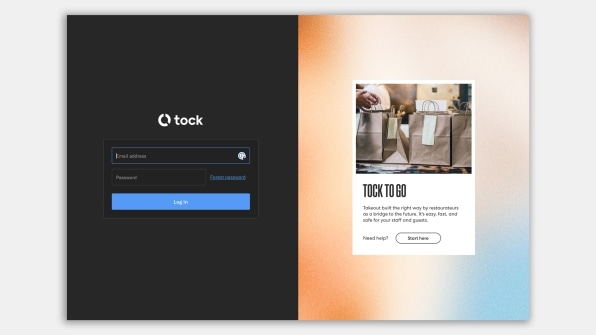
But it was during the pandemic that Kokonas may have struck upon his most industry-transformative idea yet: Tock To Go, which helps restaurants offer now-essential takeout and delivery meals, but doesn’t charge the onerous fees of services like Seamless and DoorDash, which can take up to 30%. Instead, Tock charges restaurants a flat monthly fee of $199 plus 2% on orders, or just 3% on orders without a subscription. (The service offers a “pro” plan for $699 a month, charging nothing for bookings and 2% on Tock To Go orders.) Tock also, crucially, lets restaurants retain their customer data, so they can establish their own relationships with diners.
The platform presents a compelling alternative to the third-party booking and delivery services that have been eroding restaurants’ revenue and autonomy in recent years—a trend that has been exacerbated by the pandemic. A July report from food services consultancy Technomic and Uber Eats found a 27% increase in restaurants using third-party delivery services since the pandemic began. As restaurants that are new to these platforms wrestle with how to stay in the black while paying such high commissions, regulators in cities across the country have responded by placing temporary caps (usually 15%) on the fees that third-party services can charge.
Pre-pandemic, most restaurants using Tock were on the higher end, but as Tock To Go came online, the platform brought on neighborhood gems and even dive bars looking to stave off closure. In 2020, Tock more than doubled the number of businesses that use its services to roughly 7,100 restaurants and nearly 1,000 wineries. It expects to hit $1 billion in gross merchandising volume in 2021.
“What makes Tock such a strong player is that they’re both on the reservation side and the delivery side,” says R.J. Melman, president of Lettuce Entertain You, which owns and licenses more than 100 restaurants across the country and was an early investor in Tock. “So when things open back up and take-out business becomes a lower portion of what you’re doing and your reservation business will increase, [Tock] will help you on either side.” He says that 40% of his company uses Tock for reservations, while between 80% and 90% use Tock To Go.
For Kokonas, who expresses frustration with people who complain that restaurants are a bad business, the hospitality industry may be challenging, but it’s not impossible, even in a pandemic. “If you’re [a restaurant] owner who says, ‘We could barely make it [in 2019],’ to me, that says you weren’t running it right. You’re saying it was boom time and you could barely make it,” he told me last spring. “I want these restaurants to reopen in a sustainable manner.” Restaurant owners, in other words, need to take better command of their businesses, whether they’re running a beloved local joint or a Michelin-starred, travel-worthy establishment. And Kokonas is positioning Tock to be their essential tool.
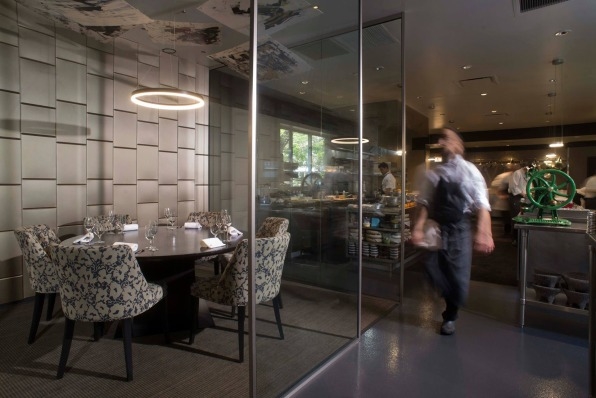
The Pandemic Plan
Kokonas knew that 2020 was about to go off the rails when he saw, last February, reservations for the 60 or so Hong Kong restaurants on Tock go to zero in a single week as the island struggled to contain COVID-19. It was clear: Once the novel coronavirus spread to the States, the same would happen here. A few weeks later he noticed the same pattern in Seattle, one of the first cities hit by the pandemic. Then it spread to the rest of the country.
When Illinois issued stay-at-home orders in late March, Kokonas and his team had already worked out a plan to turn Alinea and the other restaurants in the Alinea Group into carry-out places. He furloughed some 300 restaurant employees, but remained hopeful about rehiring them. After all, the appetite for restaurant food was still there. Those meals just needed to be consumed at home—and Kokonas needed to adapt his technology to enable that.
He pulled together a team of nearly two dozen engineers and designers, who worked around the clock to transform Tock into a platform to book and process carry-out orders. Within eight days in mid-March the team had a working prototype of Tock To Go and started piloting pickup orders at fine-dining restaurant Canlis in hard-hit Seattle. Three days after Chicago shut down, Alinea was selling takeaway Beef Wellingtons for $35—an unheard-of price for the establishment.
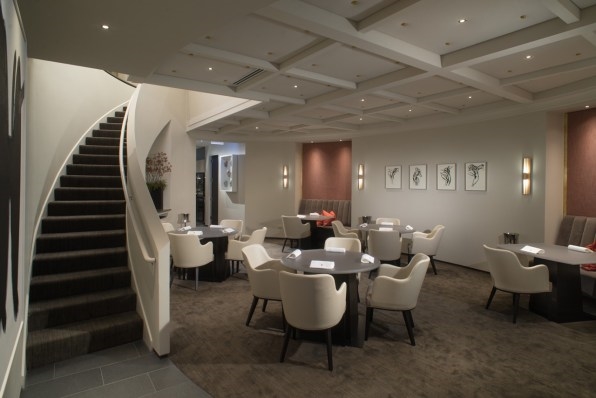
[Photo: courtesy of Tock]
Kokonas had figured out that customers uncertain about their futures did not want a $375 meal; they wanted comfort food. He pushed Alinea’s chefs to create a simple carry-out menu with the price of each meal under $40. By April, the restaurant was selling 1,250 meals a night, making about 75% of its previous revenue, and it had rehired 62 of its 85 employees. Alinea hosted diners in an outdoor rooftop space over the summer, but closed those operations in the fall as the weather turned and COVID-19 rates rose; by the end of 2020, it had served 135,587 to-go meals via Tock.
As restaurants throughout the country began closing their doors last spring and the pandemic’s grim toll on the hospitality industry became evident, Kokonas was advising chefs on Tock to lean into takeout and delivery. For many of the fine-dining places on the platform, creating meals to be eaten at home—something previously inconceivable—became essential for survival.
Chef Kyle Connaughton, of Healdsburg, California’s acclaimed SingleThread Farm-Restaurant-Inn has used Tock To Go as a stopgap to keep his luxury restaurant afloat, offering more affordable take-out meals through the service. “When you go from a $500 checkout to a $50 checkout, it’s hard. We can’t support a 75% reduction in revenue. But this has allowed us to stay open.”
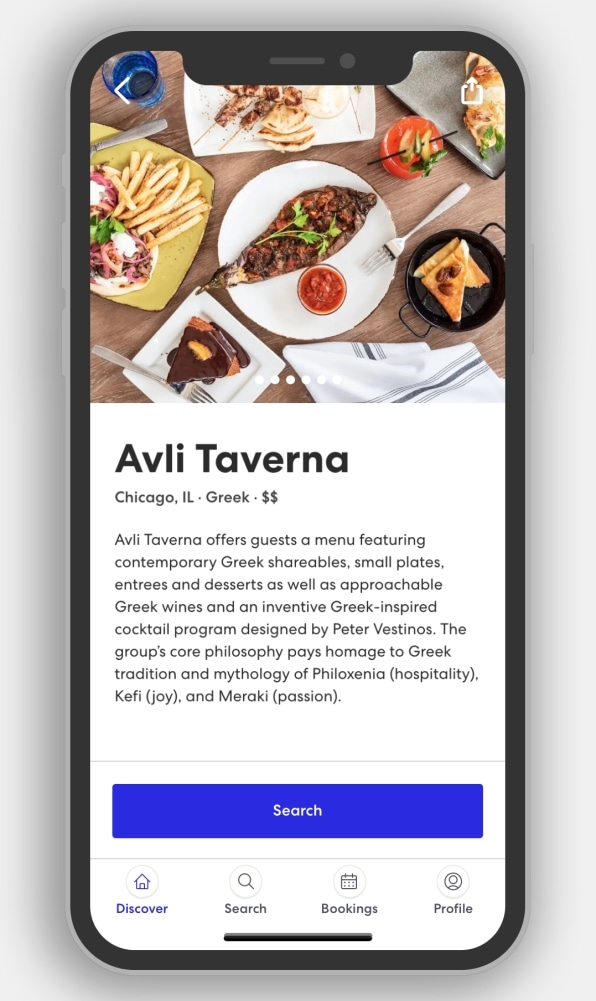
Tock To Go has also allowed Kokonas to expand his company beyond its fine-dining base. Pat Odon, the owner of Chicago’s oldest sports bar Nisei Lounge near Wrigley Field has used the service to sell mixology kits and to manage reservations as indoor dining opens up. “Tock’s fee is better than the cut other apps take,” he says. He plans to keep using the service to generate extra revenue even after the pandemic recedes. Tock also partnered with the city of Chicago in October to offer Tock To Go for free to restaurants in low-income neighborhoods, to help retain the city’s small-business fabric.
Tock To Go is different from services like Seamless, Postmates, and DoorDash in two crucial ways. First, instead of taking up to 30% in commissions, which can break a restaurant’s margins, Tock charges between 2% and 3% on all orders. On the back end, while other delivery services submit orders as they come, Tock asks users to select pickup and delivery times in 15-minute intervals. It’s the same way that Tock schedules reservations: to prevent kitchens from becoming overwhelmed. Since Tock To Go has launched, the service has added even more features, including two-way texting from within the dashboard to limit face-to-face communication. It also integrated last-mile deliveries with DoorDash and Postmates—charging diners the delivery fee.
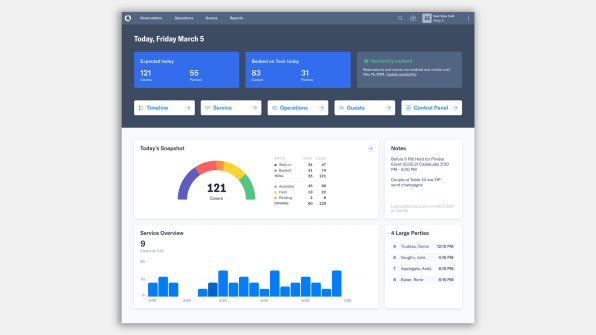
Just as important, the platform allows restaurants to keep their customer data. Noticing the negative impact that platforms like Booking.com have had on the hotel industry, Kokonas is wary of restaurant reservation and delivery services that insert themselves between chef and diner, making restaurants subservient to their brands. One of his “core beliefs” about the hospitality industry is that “businesses should ‘own’ their customers, not rent them from third party middlepersons.” He compares Tock to a company like Shopify, the commerce engine behind many direct-to-consumer brands that is increasingly positioning itself as a platform for entrepreneurs. It’s known as the anti-Amazon. “Tock empowers restaurants to actually sell what they produce,” Kokonas says.
If there’s one class of professionals that Kokonas dislikes, it’s intermediaries. He has a history of avoiding them. When he and Achatz published The Aviary Cocktail Book in 2018, a gorgeous tome with photos and recipes from their boundary-pushing Chicago cocktail bar, they produced the book entirely themselves. Kokonas just couldn’t stomach the terms that most cookbook publishers offer authors: They put the risk entirely on the chef, while reward goes almost entirely goes to the publisher—a fact that Kokonas laid out in a popular blog post at the time. Kokonas and Achatz found their own graphic designer and visual artist, raised funds on Kickstarter, and went from there. The result: They have kept most of profits of book sales and pulled back the curtain on the publishing industry.
Likewise, after corresponding with Kokonas for a while, I realized that unlike most restaurateurs I’ve emailed, he doesn’t have a press person. “A PR person from a firm has several clients, and they have to please all of them,” he explained to me when I asked about it. “So they might pitch publications in a very rote way. I figured I could just do that outreach myself.” The man behind the curtain of the Alinea Group and Tock’s press releases is, well, just him.
It’s also clear that he has little patience for restaurateurs who don’t prioritize their finances. (Another of his core beliefs: “Art and commerce are necessary for one another and improve each other.“) While Kokonas supported Paycheck Protection Program (PPP) loans to help restaurants weather pandemic, he’s openly critical of owners who didn’t use that financial support to plan ahead. “They had no expenses for two months. No rent, no payroll. If you’re doing any carry-out business at all, you did really well those couple months,” he says. “When I see some of the chefs on TV and they’re now going, ‘The PPP is terrible. It doesn’t work.’ What they’re really saying is ‘The PPP didn’t work for me because I didn’t do anything [with it].’”
At the start of the pandemic, he joined the leadership team of the Independent Restaurant Coalition, a trade group formed last year to lobby all levels of government for restaurant relief, serving alongside the likes of chefs Tom Colicchio, José Andrés, and Nancy Silverton. But he has not been been active in the group since the early days of the outbreak. He’s been increasingly vocal about supporting the $15 minimum wage and the elimination of tipping in restaurants, which puts him at odds with some members of the group. He’s also “not a huge fan” of the 2021 American Rescue Plan, which includes putting $25 billion towards grants for struggling independent restaurants and bars. His assessment: “Too much pork, no accountability.”
When it comes to delivery, he’s equally blunt. If a restaurant is paying a third-party service too much, it’s choosing cheap convenience over price. It’s up to the restaurant to switch to another service. He doesn’t believe cities should step in to set price caps on delivery fees.
When Jason Heltzer, a managing partner at Chicago VC Origin Ventures looked at his portfolio last March as the coronavirus began rolling across the country, the company he was most concerned for was Tock. Heltzer should have known better. After all, as he told me, he liked the product, but he really bet on the founder. “[Kokonas is] a contrarian, but what I have learned over time—and he’s demonstrated this over and over again—is that he knows the restaurant business. He can figure it out.”
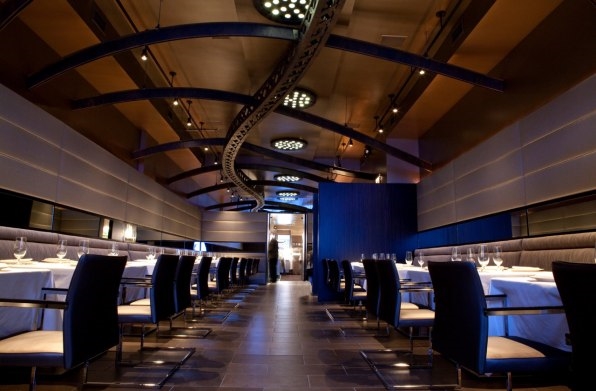
Not all seats are equal
Kokonas has always had an appetite for fine food, but his tastes can be particular. His Wikipedia page prominently mentions that he “finds peanuts and peanut butter to be repulsive.” Though his father owned a grocery store and diner, Kokonas didn’t come from great food—he describes his mother’s cooking as “terrible, so bad”—or a wealthy background.
He recalls that when his terminally ill father came to visit him in New York, he was blown away by a bowl of soup served as an appetizer at a tony restaurant. Then he saw the price: “He was like ‘$18 for a bowl of soup! What is in this soup?’” Now Kokonas owns a restaurant where meals go for hundreds of dollars a head.
Kokonas’s path to restaurants was anything but direct. After majoring in philosophy as an undergraduate at Colgate University, he turned down a spot in a JD/PhD program at the University of Pennsylvania to sell posters to sororities and small businesses—which turned out to be surprisingly lucrative. “I was a 22-year-old dude in a van, going sorority to sorority,” he recalls. “I sold hundreds of thousand dollars worth of posters.”
He followed up with a stint as a derivatives trader, then, in the early ’90s he started his own firm, Third Moment Trading, when he realized the system could be optimized to be even more profitable. He installed the first closed-cellular network, so that his firm’s traders in different cities could speak directly from their respective stock exchange pits, giving them a split-second advantage over others in the pit who relied on hand signals to communicate. But when his wife told him he was “at risk of turning into an asshole,” Kokonas quit and put his money toward traveling and dining at some of the world’s best restaurants.
His meeting with chef Achatz is now something of legend. After enjoying a couple of meals at Trio Restaurant near his Chicago home, Kononas asked to meet the chef—who was then on loan from Thomas Keller’s The French Laundry. Kokonas offered Achatz his own restaurant on the spot. In 2007, less than two years after Alinea opened and a year after Gourmet named it the best restaurant in America, Achatz developed Stage IV tongue cancer. Miraculously, he recovered after undergoing an experimental treatment at the University of Chicago, though he was missing his sense of taste. Slowly, it came back.
While Achatz was battling cancer, Kokonas was learning how to run a restaurant. He approached it like he did a trading floor: finding patterns in what might seem like chaos and then optimizing the operations. Alinea was a hot restaurant; as soon as reservation times were released, the phones, which were manned by a staff of three, would ring off the hook. Even so, some customers wouldn’t show up. This was an industry-wide trend—according to Kokonas, typical no-show rates are between 15% and 18% in normal restaurants. He looked at existing reservation solutions, like OpenTable, but determined they weren’t actually helping restaurants. To his mind, they were just wrestling away control of the customer relationship and not delivering much in exchange. “[OpenTable’s relationship with customers] bodes well for the business selling the software, but very poorly for any future innovation or features,” Kokonas wrote in a 2014 blog post.
He decided to expand on these thoughts at the 2014 Tech Table conference—sponsored by OpenTable. While Kokonas says he dislikes conflict, public feuds with Iron Chef host Cat Cora and Esquire food writer John Mariani might suggest otherwise. Perhaps a better way to put it is that he dislikes conflict, but he really, really, really loves being right. At the conference, speaking to an audience of restaurateurs and OpenTable execs, he brought up how “a clusterfuck of bad software” can destroy a restaurant’s efficiency. Then, he outlined his plans for a rival restaurant reservation service (eventually Tock) that would share customer information with restaurants and structure reservations to make it easier for the kitchens to manage orders. He also introduced his idea for prepaid reservations and dynamic pricing.
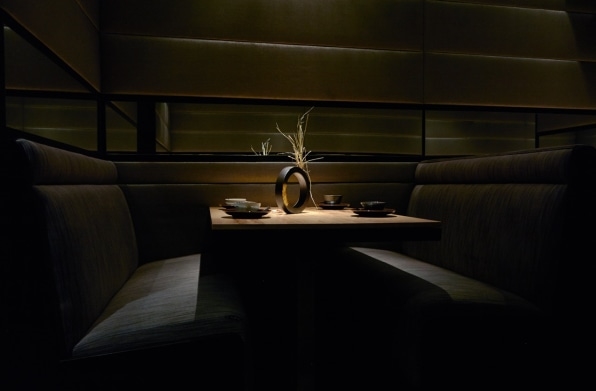
[Photo: courtesy of Tock]
At Alinea, dining is experienced like a theatre. And as in a theater, not all seats are equal: Some are closer to the door, others are near the kitchen. On top of that, demand changes depending on the day, rising on weekends and falling midweek. Kononas reasoned that the best tables at the most popular times should cost more money. He had begun testing the idea of variable pricing at his restaurant, Next, when it opened in 2014. When prepaid reservations on the rudimentary system he had built in-house sold out, he knew he was onto something big.
Tock launched in 2015, backed by investors that included chef Thomas Keller, former Twitter CEO Dick Costolo, and Kimbal Musk. The app took root among restaurants that valued its novel embrace of ticketing and dynamic pricing, its informed approach to scheduling reservations in a way that’s mindful of how a kitchen works, and its customer relationship management assistance. Early adopters included some of the world’s most prominent chefs and restaurateurs, such as Daniel Boulud and Jean-Georges Vongerichten. SingleThread’s Connaughton built his three-Michelin-star restaurant with Tock running in the background. “I had worked in restaurants and could understand how it solved the challenge of booking,” he says. “When we opened in 2016, we used it to book seats all prepaid in advance.”
Though it only had a small fraction of OpenTable’s 60,000-strong clientele, Tock commanded outsize attention, thanks to the caliber of restaurants on it and Kokonas’s one-man PR show. It was poised for even more growth after announcing a deal with Chase in February 2020 that would allow cardmembers to book Tock restaurants through a dedicated dining page and access exclusive pop-ups and dining experiences. (The hub launched in October.) Then COVID-19 hit, and Tock became two killer platforms in one: OpenTable meets DoorDash.
The sausage factory sucks
The person responsible for much of Tock’s growth over the past several years is chief operating officer Jeff Kaplan, who joined the company in 2017 after founding and selling two healthcare startups. He quickly set up Tock’s formidable sales and customer service teams. Asked about what attracted him to Tock and what made him stay, Kaplan delivers an almost Frank Capra-esque speech, “I believe in capitalism. I believe in it in the sense that I enjoy creating jobs for people, and making money for the business, and doing right by the customer. I believe you can do all of those things.”
In less than a year, the company has found success doing just that. It has also tripled its number of employees. (Kokonas admits that he used to know everyone’s names.) Wineries, ski resort operators (including Vail Resorts), and even car dealerships are now using Tock for bookings. Kokonas is looking to expand the number of restaurants and purveyors that use Tock as a marketplace to sell meal kits and other goods. He’s even toying with a Spotify Wrapped-style service that would recommend experiences based on users’ dining habits.
But Kokonas has never run a company so big or for so long. He admits that he might sell Tock. “We get inquiries every day, and I have investors. If I never sell it or liquidate part of it, then I never get their money out. They had faith in me and they deserve that return.” (Tock’s current valuation is private, but a source close to the company puts it about $500 million.) Kokonas seems to love big-picture problem-solving more than the daily grind of managing employees.
He offers a story, by way of explanation. “In 1996 Wilco’s Being There came out, and it was punk, country, and bluegrass. I listened to it three times and threw it in the garbage. I was so angry at myself. I was thinking you’re never going to make anything that good in your life. I eventually got to know [bassist] John Stirratt. When I told him I loved the album he was like, no aspect of doing that was fun. And I was like, ah, that’s the part you don’t get to see, right? Nothing’s like it seems. The sausage factory sucks. That’s true of Tock and that’s true of the restaurants. It’s true of everything.”
It makes me think of the book and film script that Kokonas told me he was working on in one of our first conversations. (Several people have told him not to write both simultaneously, but he won’t be deterred—besides, as he explains, he wants his book to read like a movie.) In it, a man wakes up from a coma and realizes his wife has been cheating on him with his best friend. He decides to leave everything and travel the world. One day, as he rests his head against the swirling marble pattern of some shower tiles in a Florence hotel, he wakes up in hospital and realizes . . . it was all a lucid coma dream. And having dreamed about the alternative life he could be living, he embarks upon it for real this time, leaving his wife and setting off. Some time later he ends up back in the shower in Florence, looking at the swirling marble pattern and it hits him: What if this was all a dream again?
There’s always another problem to figure out, whether it’s the most efficient ways to get posters to college students and messages to derivatives traders or how to maximize profit on book sales and restaurant tables. Perhaps the most intriguing question when it comes to Nick Kokonas is which one he’ll decide to solve next.
A quote about author T. Harv Eker and a Wilco album title were updated. Additionally a description of Next was updated to reflect that it is a restaurant.
To see Fast Company’s list of the top 10 Most Innovative Companies in dining for 2021, click here.
(79)



